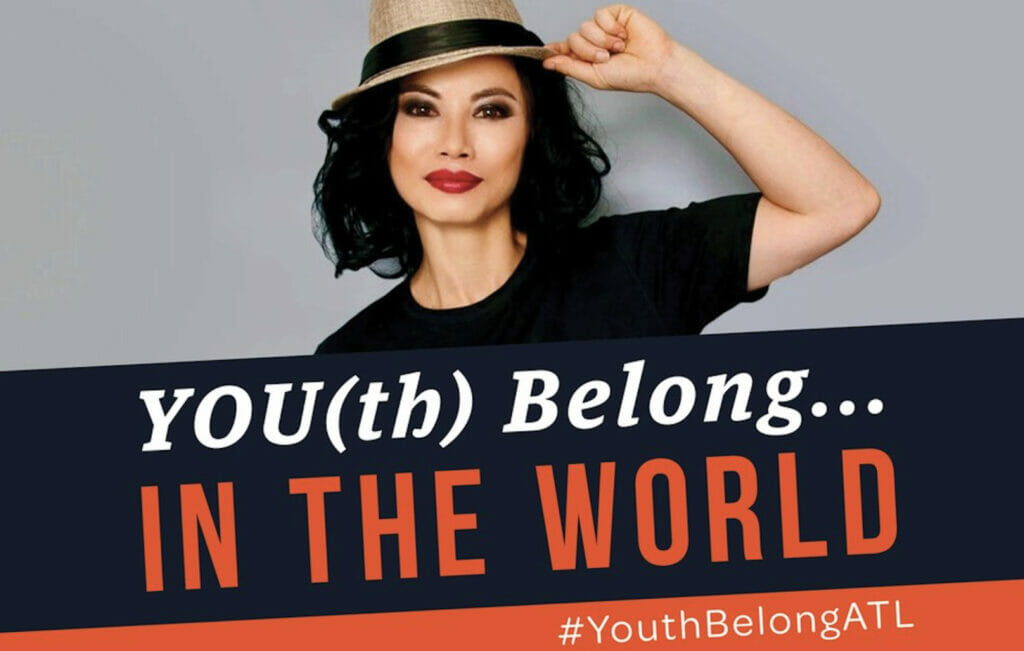The transformative power of storytelling was on full display in downtown Atlanta, GA, on May 18 for the second installment of “You(th) Belong: Connecting Atlanta’s Youth with the City’s LGBTQ+ History, Legacy, & Culture”—a series of conversations in partnership with The LGBTQ Institute at The Center for Civil and Human Rights and Kaleidoscope Village. The latest in the series elevated the voice of renowned Asian-American LGBTQ advocate, author, and athlete Amazin LeThi, in observance of Asian American and Pacific-Islander Heritage Month (AAPI) celebrated each May.
According to Asian Pacific Heritage, the month of May was chosen to commemorate the immigration of the first Japanese people to the United States on May 7, 1843, and to mark the anniversary of the completion of the transcontinental railroad (the majority of the workers who laid the tracks were Chinese immigrants) on May 10, 1869.
Born in Saigon, Vietnam (now Ho Chi Minh City), and orphaned by her mother shortly after, Lethi’s journey to becoming an international success—dividing her time between London and Atlanta with speaking engagements and advocacy in several time zones—came as a surprise.
“I never set out to be an advocate,” LeThi told the captivated audience of youth and adults who gathered to hear a different LGBTQ experience. “All I wanted to do was help LGBTQ kids by sharing my story,” she added.

Part of her story, LeThi says, includes being bullied constantly as a young child because of her ethnicity and sexuality. LeThi tells GLAAD that she found refuge and began to unpack the truth about her identity in sports. She discovered bodybuilding at age six and became a competitive bodybuilder in her teens before qualifying as a strength and conditioning coach. She says sports provided a sense of community she’d been searching for.
“I had no self-worth. I had absolutely no confidence in myself at all,” LeThi says. “But it was that one opportunity through sports that gave me the confidence to see myself for the first time and actually love myself.”
While the image of a successful athlete and budding advocate became more apparent to LeThi, another reality was also emerging. There were no other openly LGBTQ athletes standing next to her.
“I never saw any LGBTQ people in sports. I never thought there could be a time where we would see out athletes,” LeThi says. ‘Without a mirror image of myself in the media, I had to create my own narrative as a child and, as an adult, this helped me stand in my own truth to be brave and unapologetic as an openly out Asian woman,” she writes.

Peter Tran, a Yale University student who moderated a discussion with out gay Atlanta Jewish leader Rabbi Joshua Lesser following LeThi’s talk, spoke to GLAAD about the importance of queer Asian representation and the impact of LeThi’s advocacy.
“Like Amazin, I didn’t know any queer folks, let alone Asian queer folks,” Tran says. “And particularly going to Catholic schools, it was very much a hush-hush topic.”
“As a youth involved in a lot of nonprofits here in Atlanta, I’ve witnessed programming being taken away from youth,” says Dequadray White, Program & Volunteer Coordinator for the Atlanta Pride Committee. “And especially with me being Black and queer, I never had any programs at that intersection. So it’s beautiful to see community members that look like me create programs for future generations,” he said.
“It’s hard to describe the power that comes with visibility. I feel grateful that I was able to learn from Amazin, and I’m proud of all of her achievements,” Tran said.
On her long list of achievements is a 2016 recognition from GLAAD for being one of only seven Asian LGBTQ activists accelerating equality globally. In May 2021, Forbes Magazine listed LeThi as one of six extraordinary Asian women during AAPI Month. However, she refuses to allow her impact and that of her Asian and Pacific Island brothers and sisters to only receive acknowledgment during May.

“I always say, like being Black, like being Jewish, like being LGBTQ, [being of AAPI heritage is] not just a month, because we are that way 365 days a year,” LeThi told the audience. “It’s important because it’s a moment during the year when our heritage, our culture, our people, our history is celebrated. There’s so much power in storytelling, and for Asian kids to hear stories like mine and to know that my story is their story,” she said. “And I think what’s happening across the US—LGBTQ history is being banned. Black history is being banned. It’s so important to know your heritage and to know that there were giants that came before you,” says LeThi. “The reason that I’m sitting here today is because of API people that came before me.”













